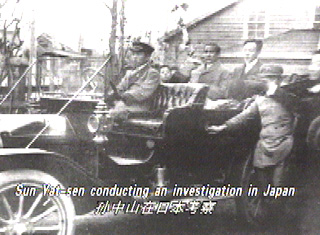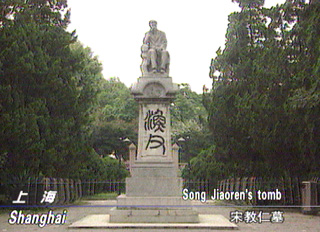 |
|
A Volatile World (2)
Setbacks for the Democratic Forces |
| CCTV.COM 2002-09-10 13:09:03 |
|
Beijing was in jubilation, because New Year's Day of 1913 was the first holiday in the solar calendar after the founding of the National Republic. Yuan Shikai gave a cocktail party to entertain foreign diplomats at the official residence.
Empress Dowager Longyu died of illness in February of that year. A grand funeral was held by Yuan Shikai to show his lenience to the abdicated imperial ruler.
 At the same time, Sun Yat-sen asked for Yuan's instruction and went to Japan to investigate its railways and industry and commerce. He didn't expect that one month later an incident took place in China that stopped his trip. At the same time, Sun Yat-sen asked for Yuan's instruction and went to Japan to investigate its railways and industry and commerce. He didn't expect that one month later an incident took place in China that stopped his trip.
At 10:45 pm on March 20, three gunshots were heard from the ticket-checkpost of the railway station of North Shanghai. Song Jiaoren, leader of the Nationalist Party, was assassinated.
Two months ago, Song Jiaoren left Changsha to begin his campaign tour. At the age of 31, he had a stronger political enterprising spirit than other leaders such as Sun Yat-sen and Huang Xing. He thought revolution was successful but its political aim had not been achieved. He made campaign speeches in the south, calling on Party members to form a responsibility cabinet to limit the power of the President. Two months later, the Nationalist Party won in the parliament election. Yuan Shikai was in a worry and urged Song Jiaoren to return to Beijing to discuss the state affairs.
It was a soul-stirring event for the 15 month-old National Republic of China to face up to the assassination. It made the changeable situation even worse. Song Jiaoren still cherished hope for Yuan Shikai when he was at his last gasp. He entrusted Huang Xing with his work and hoped that the president would try his best to safeguard civil rights. Two days later, he died. Ying Kuicheng, the direct instigator, and Wu Shiying, the murderer, were caught on the third day after the incident. People found from many coded telegrams that were confiscated that Prime Minister Zhao Bingjun of the Yuan government had direct ties with the incident. Within a period of less than a year, the three men died a sudden death. That made the incident more complicated.
In Shanghai, members of the Nationalist Party published an open telegram of the evidence of the incident to the nation with a target of attack at Yuan Shikai. The case of Song Jiaoren became the most famous political murder in the early days of the National Republic.
 Sun Yat-sen hurried back to Shanghai from Japan, and discussed how to solve the Song case. When an argument of whether armed forces were used to fight against Yuan was going on within the Nationalist Party, Northern Warlords Army under Yuan Shikai had already mustered. Acting on Sun Yat-sen’s instruction, Li Liejun took a solemn pledge at a mass rally in Jiujiang on July 13 before attacking the Yuan forces. The second revolution broke out that was responded by many provinces. An anti-Yuan struggle was gaining momentum. It was the first north-south war launched by the republic after its founding. Owing to haste in preparing the uprising, the insurrectionary army was defeated in less than two months by the well-equipped Northern Warlords Army. Sun Yat-sen hurried back to Shanghai from Japan, and discussed how to solve the Song case. When an argument of whether armed forces were used to fight against Yuan was going on within the Nationalist Party, Northern Warlords Army under Yuan Shikai had already mustered. Acting on Sun Yat-sen’s instruction, Li Liejun took a solemn pledge at a mass rally in Jiujiang on July 13 before attacking the Yuan forces. The second revolution broke out that was responded by many provinces. An anti-Yuan struggle was gaining momentum. It was the first north-south war launched by the republic after its founding. Owing to haste in preparing the uprising, the insurrectionary army was defeated in less than two months by the well-equipped Northern Warlords Army.
Founders of the republic were listed as wanted. The Qing government put up a notice to post a reward of 5,000 silver dollars for their capture while a reward of 100,000 dollars was set for capturing Huang Xing. Revolutionary leaders had to go into exile abroad once again.
October 10 of that year was the second anniversary of the founding of the Republic of China. Yuan Shikai was sworn in as President at the Hall of Supreme Harmony of the Forbidden City, a place he chose, and the ceremony was held in a way as that of a former emperor ascending the throne. What he did gave people plenty food for thought.
|
|
Editor: Liu Baoyin CCTV.com
|
|
|
|
|
|
 |









